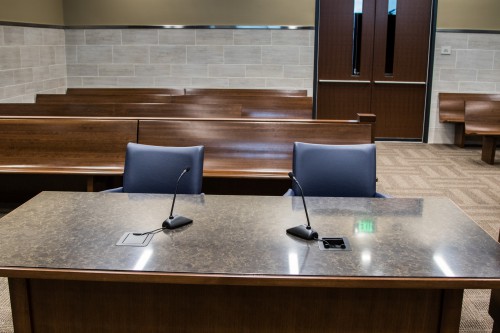 By Samantha Romero
By Samantha Romero
The trial against defendant Javier Andres Rocha reconvened in Department 13 after the lunch hour with closing statements by both parties. The burden lies on the People to prove the defendant was driving under the influence of marijuana.
“The defense is in denial that (the defendant was) under the influence,” stated Deputy District Attorney David Robbins, representative for the People.
The defendant must have full possession of his faculties while driving, but the driving pattern as observed by witness Sergeant Eric Labbe of the Davis Police Department indicated otherwise. Without signaling on a straight highway, Mr. Rocha weaved several times into the other lane.
Cannabis is a stimulant, the court learned from Senior Criminalist of the California State Department of Justice, Nadina Giorgi. Despite the patrol vehicle following Mr. Rocha behind and beside him, Mr. Rocha continued speeding.
These are signs of motor skill impairment and physical impairment, argued Mr. Robbins.
When stepping out of the vehicle, Mr. Rocha was unsteady on his feet, holding onto the car for balance.
During the field sobriety test, Mr. Rocha “lacked convergence.” When asked to follow the stimulus, the defendant’s eyes moved in one direction at first, but then in another direction.
His eye movements were a sign of recent (marijuana) usage.
The walk and turn test provided clues that were of some concern. Overall, Mr. Rocha did okay in this test, but he was a bit wobbly.
“We are only looking for impairment,” Mr. Robbins reminded the jury. It wasn’t horrible—but it wasn’t perfect.
As for the Romberg’s test of balance, the defendant was within the normal range. However, “just because you’re in the normal range, that doesn’t mean you’re not impaired,” stated the prosecutor.
Lastly, as shown in People’s Exhibit No. 3, the defendant was touching his nose in several areas. Mr. Rocha did not touch the tip of his nose, he touched the sides of his nose and his bridge area.
“It’s easy, it’s tempting” to jump to conclusions just like Sergeant Labbe did, argued Deputy Public Defender James Bradford, representing Mr. Rocha. If an officer has suspicion, it is their duty to check what is going on when they see a vehicle weaving between lanes.
But Mr. Bradford suggested, “That driving pattern is not so extreme.”
In addition, the sergeant’s observation happened only over a few seconds—a half mile to a mile. During this short time frame, it is easy to pick up clues that may indicate impairment.
Mr. Bradford explained the situation as such: The officer pulled up beside the defendant’s vehicle and the defendant reduced his speed, then the officer pulled up behind the vehicle (with police 
lights activated) and the defendant signaled to pull over and park alongside the freeway.
Marijuana delays the processing of information. Without any issues, however, Mr. Rocha was able to park his vehicle safely alongside the freeway.
Stepping out of the vehicle, Mr. Rocha did “the natural human thing to stay close to the vehicle when there is ongoing traffic” in the middle of the night at 10 p.m.
When questioned about the strong smell of marijuana in the car, the defendant admitted to smoking marijuana earlier that day, as well as smoking inside his vehicle on numerous occasions. Blood work demonstrated that traces of marijuana were found in the defendant’s blood, but there is no possible way for anyone to know if the defendant had smoked more recently than claimed.
Mr. Rocha also told Sergeant Labbe that he has back pain, but he still complied with the officer’s instruction to take the (voluntary) field sobriety test—even though Sgt. Labbe testified to never making someone take the test if they had any medical conditions.
In his May 2017 testimony, Sergeant Labbe had observed “watery eyes,” never mentioning “blood-shot eyes” or “red eyes”—which are typically associated with marijuana use—until yesterday’s hearing.
According to Mr. Bradford, there is no evidence to show correlation between marijuana smoked earlier in the day and the defendant’s alleged impairment in the incident.
The officer was only looking for probable cause to arrest, not to quickly prove the charge beyond a reasonable doubt—a much higher burden of proof. The jury’s job is to be critical—to take a stand back and think critically, urged the defense attorney.
It is the totality of the circumstances, not that there weren’t imperfections, rebutted Mr. Robbins.
He said that Sergeant Labbe is not an officer who is hunting people for DUIs. If he were, he “would have 200 arrests (for DUI) not 60.” When making notations on the field sobriety test form, Sgt. Labbe was being “too nice, not too aggressive.”
Claiming to have woken up at 3 a.m. (after seven hours of sleep), the defendant was shown, on the dashboard camera footage, hitting the reflectors on the freeway lanes.
Another sign of impairment was not following the officer’s instructions accurately when asked to lift his leg for 30 seconds. Rather than counting as “one-one-thousand, two-one-thousand…” to thirty, the defendant counted the seconds as “one… two… three….”
Mr. Robbins bluntly disagreed with the defense, stating that there was mental impairment present.
When being asked his date of birth the defendant took a long pause to answer. The dashboard camera footage shows Mr. Rocha, when asked for his home address, struggling to answer that simple question.
With a final image on the jurors’ minds, the prosecutor played People’s Exhibit No. 4, illustrating the defendant’s unsteadiness while walking on the freeway pavement.
The defendant was in denial of how much it affected him—denial of how impaired he was due to the marijuana, concluded Mr. Robbins.
Keeping in mind that the verdict must be a unanimous vote, the jury was sent to begin their deliberation.
At approximately 4:30 p.m., the jury was sent home. Deliberation will continue tomorrow morning, after gathering at 8:30 a.m. in Department 13.





